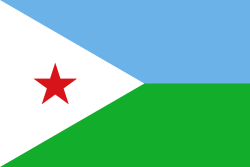| Football in Djibouti | |
|---|---|
 | |
| Country | Djibouti |
| Governing body | Djiboutian Football Federation |
| National team(s) | Djibouti national football team |
| Clubs | Djibouti Premier League |
International competitions | |
Champions League CAF Confederation Cup Super Cup FIFA Club World Cup FIFA World Cup(National Team) African Cup of Nations(National Team) | |
Football is the most popular sport in Djibouti. [1] [2] [3] The country became a member of FIFA in 1994, but has only taken part in the qualifying rounds for the African Cup of Nations as well as the FIFA World Cup in the mid-2000s. In November 2007, the Djibouti national football team beat Somalia's national squad 1–0 in the qualification rounds for the 2010 FIFA World Cup, marking its first World Cup-related win.
